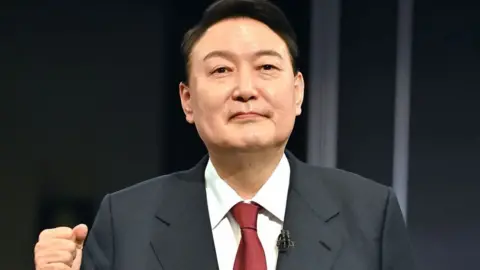South Korea: Conservative candidate Yoon Suk-yeol elected president
 Getty Images
Getty ImagesSouth Korea has chosen a conservative opposition candidate, Yoon Suk-yeol, as the country's next president following a tightly-contested race.
Mr Yoon, a political novice, edged out a victory over the Democratic Party's Lee Jae-myung based on promises to tackle class inequality.
He called his win a "victory of the great South Korean people".
But the result was one of the closest in history - with the final count separated by less than 1%.
Early on Thursday morning, Mr Yoon told supporters at his victory ceremony he would "pay attention to people's livelihoods, provide warm welfare services to the needy, and make utmost efforts so that our country serves as a proud, responsible member of the international community and the free world".
Both presidential candidates were viewed as widely unpopular throughout the campaign. Analysts said voters appeared so disenchanted by the frontrunners that local media dubbed the vote "election of the unfavourables".
Still, Wednesday's election saw a high turn out, with 77% of eligible voters casting a ballot.
Top of voters' concerns were skyrocketing house prices, stagnant economic growth, stubborn youth unemployment and gender inequality.
Mr Yoon had also made abolishing the Ministry of Gender Equality and Family a central pledge of his campaign.
The ministry largely provides family-based services, education, and social welfare for children and spends around 0.2% of the nation's annual budget - less than 3% of which goes towards the promotion of equality for women.
During his campaign Mr Yoon had also leant heavily into a support base of young men, some of whom declared that there was no systemic gender discrimination in South Korea.
Demographic breakdowns of the vote showed that many had voted for the third female candidate Sim Sang-jung who'd advocated for gender equality, the BBC's Laura Bicker reports.
In the foreign policy space, Yoon has promised a tougher "reset" on relations with China and North Korea and indications of closer ties with the US.
The White House has already sent its congratulations to Mr Yoon, saying US President Joe Biden is looking forward to further expanding the two countries ties
Yoon will become president but with a Democratic Party-majority in the single-house National Assembly. The incumbent Moon Jae-in of the Democratic Party had to step down due to constitutional five-year limits of the presidential term.

Who is Yoon Suk-yeol?

South Korea is about to usher in a new era as a conservative has won the battle to be president. But only just.
Yoon Suk-yeol's victory over his liberal rival Lee Jae-myung is far from decisive. He has won the presidency by less than one per cent - a sign of just how bitterly divided politics in the world's tenth largest economy has become.
Mr Yoon only entered politics last year and rose to prominence for successfully prosecuting the former conservative president Park Geun-hye on bribery and corruption charges.
The political novice has been compared to the former United States president Donald Trump and has been prone to gaffes throughout the campaign.
He had to walk back a comment that the authoritarian president Chun Doo-hwan, who was responsible for massacring protestors in 1980, was "good at politics".
He has pledged to abolish the Ministry of Gender Equality and has blamed the rise of feminism for the low birth rate in a country which has one of the worst records on women's rights in the developed world.
He is more hawkish on foreign policy than the current liberal leader Moon Jae-in.
He has said he will aim to develop technology to carry out a pre-emptive strike on North Korea if Pyongyang looks to attack Seoul and he supports sanctions on Kim Jong-un's regime which will bring him more in line with the policies of South Korea's main ally, the United States.
He wants to be tougher on China and proposed that South Korea should co-operate more fully with the Quad security alliance between the US, Australia, India and Japan, an informal grouping created to counter Beijing's growing influence in the region. But he stopped short of saying Seoul should join the alliance.
His views on foreign policy are a decisive shift from his predecessor who favoured engagement with Pyongyang and largely avoided taking a stance that would inflame China, the country's largest trading partner.